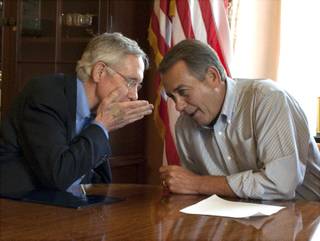Sunday, July 24, 2011 | 10:03 a.m.
Sun archives
- Harry Reid says debt ceiling negotiations 'rocky' (7-23-2011)
- Debt crisis: Deal sought in Washington to head off stock plunge (7-23-2011)
- Lots of private talks, but still no deal, on debt ceiling (7-21-2011)
- Boehner: House will compromise on debt limit (7-21-2011)
- Reid sends signal he won’t back compromise bill based on budget cuts (7-21-2011)
- With debt ceiling decisions will come consequences — practical and political (7-15-2011)
- Dean Heller takes hard line on debt ceiling, wants balanced budget amendment (7-15-2011)
- Latest developments in debt ceiling standoff (7-14-2011)
- Debt ceiling debate colors Nevada 2012 elections (7-8-2011)
- Harry Reid to keep Senate in session as debt limit deadline looms (6-30-2011)
- Berkley says no to raising debt ceiling, refuses ‘show vote’ (5-31-2011)
- Measure on raising debt ceiling not likely to gain traction (5-31-2011)
Washington's back is against the wall, with only hours to show some progress on a deal to raise the U.S.'s debt limit, or risk the Asian markets posting the financial reaction to the sudden disruption in negotiations that began Friday night. They'll likely be negative.
With that in mind, House Speaker John Boehner is poised to force the President and Democrats' hand, by putting out a plan of his own, and pointing to the calendar to call their bluff.
"I would prefer to have a bipartisan approach to solve this problem," Boehner said on Fox News Sunday. "If that's not possible, I and my Republican colleagues in the House are prepared to move on their own ... today."
Republicans have been hammering Democrats, since Boehner left talks he'd been having to raise the debt limit Friday night, to accept a short-term debt limit: five or six months in exchange for a modest package of cuts, with any further hikes to be negotiated down the line.
That technically meets President Obama's bottom line, which is that the debt limit has to be raised — and Republicans are charging that if Democrats push for anything longer-term, it's just because they're scared about talking about this so close to the 2012 election.
"The President has to ask himself: is my reelection more important to me than the potential for default?" Sen. Jon Kyl, the Republican Whip, said on CBS's Face the Nation this morning.
But Democrats say they're the pragmatists, and the Republicans are the ones playing political Russian roulette.
"A short-term extension of the debt ceiling would jeopardize our economy," Sen. Dick Durbin, Democratic Whip, said while appearing on Face the Nation opposite Kyl. He added that all three credit rating agencies — Moody's, Standard & Poor's, and Fitch — had warned lawmakers that while a short-term lift of the debt limit might temporarily keep the country from defaulting, it won't be enough to keep U.S. credit intact.
"Speaker Boehner is ignoring that warning," Durbin said. "If we fail to extend the debt ceiling we will be imposing a new tax on working families and businesses across America...the American economy is too fragile at this point for us to allow that to happen."
If the U.S.'s credit is downgraded, it essentially labels the country as a riskier entity to lend to; and just like at a bank, those who are considered less likely to be able to pay back loans are charged a higher interest rate.
If that happens to the government, it ricochets through the U.S.'s domestic economy, raising interest rates everywhere — which Republicans and Democrats agree translates into higher credit card rates, less-accessible commercial loans, and a higher cost of living.
Republicans aren't addressing that point head-on, but point to 38 instances in the last three decades when interest rates were raised for periods of six months or less, and the U.S.'s credit wasn't downgraded.
But there's one difference: the economy, since 1982, has never been in quite as bad a shape it is now.
It remains the case, however, that the country is almost out of time.
The Senate needs about a week to be able to work its way through a controversial bill, as there are lawmakers in the Senate who might try to block or filibuster the legislation. Likewise in the House, Boehner has to worry about a potential mutiny in the Republican ranks if he presents them with anything less than a total win: there are several members of that body who are prepared to vote against a debt limit package if it has anything that even smells like an indirect tax hike in it.
That puts the deadline for coming up with a package and starting it through the legislative process at about mid-week this week.
But then there's that pesky detail about the Asian markets.
The financial markets are truly going to be the final judge of what even the worse-case scenario will mean for the economy, as it's on those trading floors that government spending connects most directly with consumer confidence in the private sector.
The currency markets in New Zealand, which don't have a great amount of influence over U.S. and other global markets, open at 4p.m. EST. The main stock markets in Australia and Japan then open at 8p.m. Eastern -- at which point some sort of a pre-deal has to be made, lawmakers are saying, to avoid the first stages of financial havoc.
Reid and Boehner are expected to meet again this afternoon before those deadlines are hit.


Join the Discussion:
Check this out for a full explanation of our conversion to the LiveFyre commenting system and instructions on how to sign up for an account.
Full comments policy